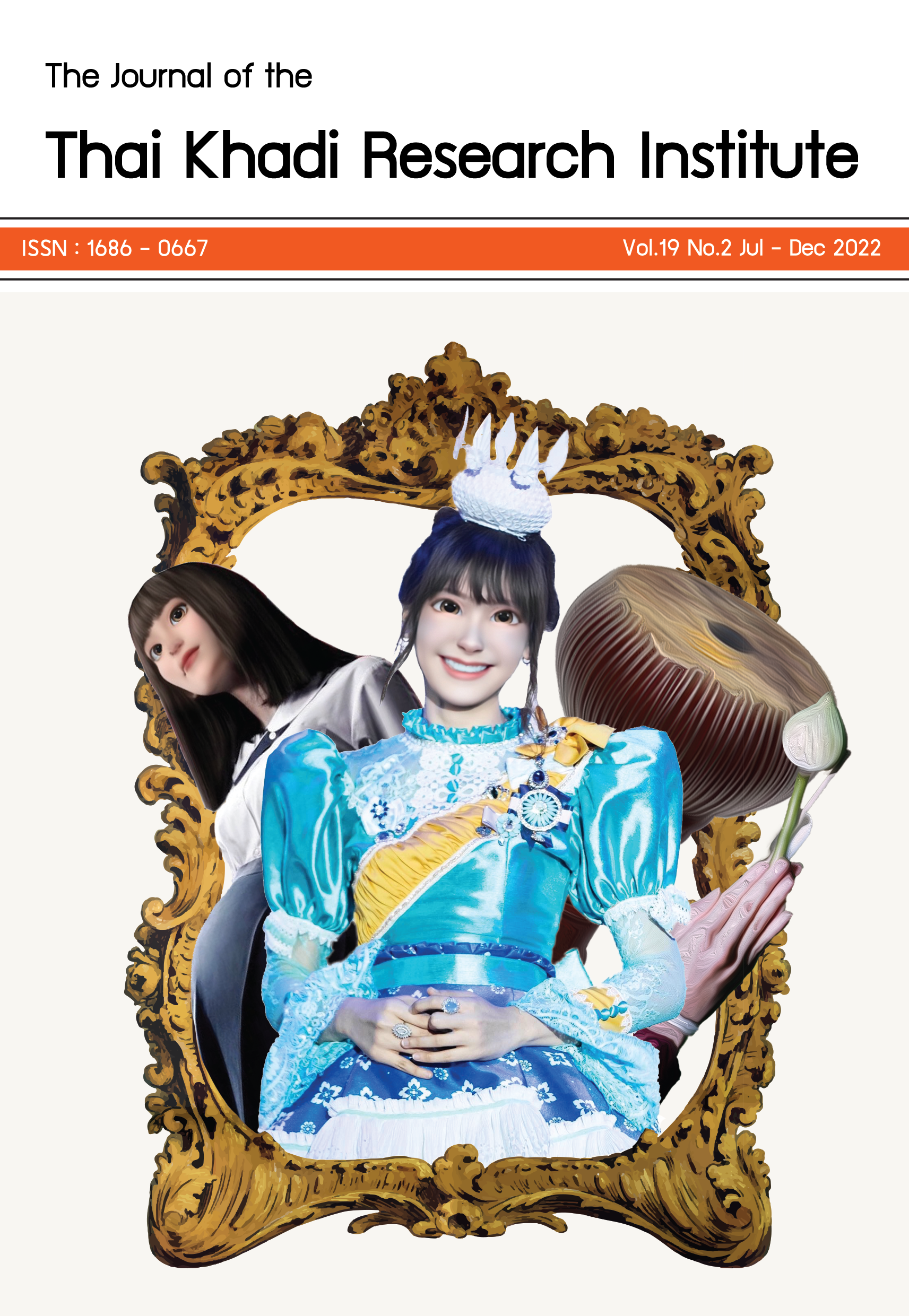“Thainess” is a kind of discourse used to illustrate the cultural identity of Thai people as well as to create merchandise and service of economic values under the global culture dynamic and globalization. Case studies on Thainess presented in the Journal of the Thai Khadi Research Institute Vol.19 No.2 are as follows:
Thainess in “T - pop”: The Presentation of Thai Art and Culture in MVs by Thai Idol/Girl Groups during 2011 - 2021 by Thanapiti Thipa. This article studies Thainess in Thai idol/girl groups’ music videos over the past decade. Findings reveal that Thainess in Thai idol/girl group music videos is little, compared to other Thai popular music. Meanwhile, Thai popular music videos are more likely to accept the influence of Western, Japanese and Korean popular music in order to be modernized and popular among teen consumers.
Ram Thon Khok Sao Long: The Construction of Emergent Authenticity in Cultural Tourism Management of Khoksalung Community by Pornsawan Tripasai. The article deals with the cultural authenticity of Ram Thon Khok Sao Long, a local folk song performance constructed from the combination of the legend entitled “Khok Sao Long” and Ram Thon. Although the initial purpose is to create an authentic learning experience for tourists while increasing economic value to local performance, the staged authenticity has eventually become real and a pride for Khoksalung villagers.
How to Apply a Cultural Dimension for Supporting Community Tourism of Ban Huai Wai Phatthana, Buriram Province by Utis Tahom, Sujitra Yangnok, Khemeka Arrom, and Santipap Charam. This article focuses on a sustainable tourism development in a community in northeastern Thailand through the development of cultural resources, public relations, management, and community participation models. Positive impacts on local economy and other aspects are identified.
The Origin and Development of the Pattern of Acanthus Leaf in Thai Art by Supachai Sermsukcharoenchai. This article studies the pattern of Acanthus leaf in Thai artworks since the reign of King Narai the Great when Ayutthaya had close contacts with Western nations and Acanthus leaf was widely used to decorate the pediments of Western style buildings. In the reign of King Rama V, the pattern of Acanthus leaf was made by Western artists working for the Royal Court of Siam, and was authentic Western art. Thai master artisans in Ayutthaya and Rattanakosin periods adapted Acanthus leaf to Thai artistic style before combining it to traditional Thai patterns.
Shakh Muhummad Ali Sukari: Ritual and Belief of Thai Muslims in Phukhao Thong Community, Phranakhon Si Ayutthaya Province by Komluck Chaiya. This article studies the principle and practices of Thai Muslim Kodiriyahs living in Phukhao Thong community, Phranakhon Si Ayutthaya Province, which are characterized by high respect towards their spiritual leader, Shakh Muhummad Ali Sukari or To Kisaeh (1848 - 1932). Four rituals are held annually in his commemoration, distinguished by a procession carrying around his palanquin. At present, rituals and beliefs in To Kisaeh have been serving as a spiritual anchor to local population, help unite relatives and build networks among Kodiriyahs living in different parts of the country.
Technologies of Death, the Obliterated Torture and the Peace of Capital Punishment by Poowadon Chai-in. In this article, the author points out that throughout the Thai history of capital punishment there exist the collision of different political paradigms concerning the use of technology to punish and execute individuals sentenced to death. The invention of technology of death was supposed to be evolving under the concept of humanity and peace; in fact, it has been used by Thai state to govern and dominate people’s mind while obstructing the establishment of peace in society.
“Adolescent Mother” Discourse: A Case Study of the National Strategic Plan of the Prevention and Solution of Adolescent Pregnancy Problems B.E. 2560 - 2569 (2017 - 2026) by Patcha Jeungklinchan, Malee Jirawattananon and Narupon Duangwises. In this article, the authors analyzes adolescent mother discourse in the national strategic plan, using Foucault’s discourse analysis methodology. Findings show that the definition of adolescent mother is in line with universal standard and adolescent mother is considered a social problem. Sexuality and reproductive health knowledge put more pressures on women than men, resulting in continuing sexual bias. Thai state uses governmentality to control the reproduction of sexual responsibility and childhood discourses. Meanwhile, good mother discourse gives rise to social expectation that adolescent mothers raise their child; otherwise they are considered irresponsible mothers.
The Decade of Thai Khadi Research Institute: Academic Status of Knowledge by Ratchapon Yamkeep. This article explores the knowledge status of Thai Khadi research conducted during 2009 - 2018. The results show that, internally funded by Thammasat University and Thai Khadi Research Funds, most research is collaborative, with two or more Thai Khadi researchers working on the project. The researcher’s expertise is a starting point and a key tool for doing research in all disciplines.
Taste and Fan Clubs in ASEAN and China: Online Marketing and Politics of Emotion by Amphon Jirattikorn. A book review by Boonyanuch Nakha. One of the author’s main arguments is that the export of Thai TV series, a kind of soft power, has been obstructed so far by the stagnant TV production industry, the melodramatic characteristics of Thai soap operas and the lack of systematic support from the government. The reviewer suggests that in a rapidly changing society, details of situation, time, and social contexts should be taken into accounts in the analysis of fan clubs of different sub - cultures and tastes.
In addition to research articles and a book review, brief reports on academic, arts and cultural activities organized by the Thai Khadi Research Institute from July through December, 2022 are presented.
It is hoped that the Journal of the Thai Khadi Research Institute will be a forum and mediation for dissemination and exchange of knowledge on ‘Thai studies’ that benefit the academic community and the general public as well. Any contributions to the Journal, either article submission or readership, are highly appreciated.
Published: 2022-12-23


